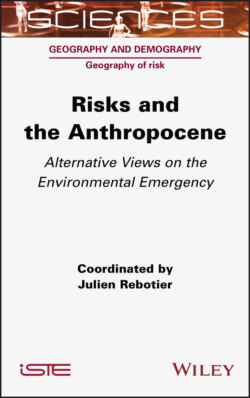Читать книгу Risks and the Anthropocene - Julien Rebotier - Страница 13
I.1.2. The Anthropocene: a new moment for thinking about risks?
ОглавлениеToday, the notion of the Anthropocene is the focus of attention for environmental concerns. However, its content and temporal boundaries are still under discussion and controversy. Consequently, similarly to the French version of the book, the Anthropocene will not be capitalized throughout the book2. This editorial choice has not been imposed on the authors, but each of them has been careful to specify the preferred meaning when using the term. Whether it is a question of the more restricted geological meaning, of the craze that the notion arouses, of its effects in the political and scientific spheres, or of the reflection of a broader context for thinking, living and making the world, the effort to clarify the meanings of a term that remains polysemous is recalled by the use of Anthropocene3, or even Anthropocenes.
Engaged in this work of elucidation, the social sciences provide information on risk situations and their meanings (material, symbolic, political, economic) in their contexts. In this way, they shed light on the social world and the contexts in question, and on the moments to which the risk situations and their analysis correspond. Reducing the consequences of disasters is a legitimate objective for research. But the social sciences also have the mandate to produce intelligibility, in this case through the undertaking of risk situations. In this sense, risks can be reconsidered in the light of an Anthropocene “moment”, in the same way as other phenomena or issues such as globalization, justice or resilience (Chandler et al. 2020). The Anthropocene would introduce a “remarkable sequence” for renewing the understanding of life on Earth due to new articulations between living beings and the biogeochemical mechanisms of the planet. It remains a moment to be defined.
It is difficult to account for the diversity (and even contradictions) and the finesse of knowledge on risks. It is also difficult to introduce the notion of Anthropocene without arbitrating between its meanings, and between the terms used. Sequence or geological epoch? Living beings rather than human beings, whereas the human race often locks the discussion into the opposition: humanity versus the rest of the world. Choosing to use the category of humanity is a shortcut of thought that is rarely used in a measured way. It carries laudable ideals as well as obliterating abysmal inequalities. Finally, is the Earth correct to refer to a system and conditions that allow the living being to be accommodated? The planet Earth, then, unifies yet certainly oversimplifies the complexity of biogeochemical processes that we are now sure have a global history since their unprecedented trajectory is incomprehensible without human influences.
The Anthropocene is a 21st-century notion, marked by the seal of the physical and earth sciences. Like many other concepts, it has been taken up by the social sciences and is the subject of controversial, sometimes contradictory and virulent debates. Once the “Anthropocene event” (Fressoz and Bonneuil 2015) has passed through the stupefaction of its possible implications and the vagueness of its definition, which goes hand in hand with a certain anxiety (can we really measure it?), it is appropriate to return to the way this event forms a turning point to the ordinary and significant course of social relations and events; in the modes of production, of living, of circulating; in the complexity of the interactions that are established between humans and non-humans. To give an account of an intellectual, institutional, scientific and political conjuncture at work in the opinion as much as in more academic or programmatic registers sends us back to the complexity of a moment. In this sense, the Anthropocene moment corresponds to a historical period that is characterized by ways of thinking, arguing and acting, both collectively and individually, particularly with regard to the attention given to the environmental issue in our societies. The Anthropocene as a moment refers as much to the possible objectifications of an unprecedented sequence of relations between societies and environments as to the need to reconsider certain reference points and major structuring narratives of a modernity that is emerging from the 20th century bled dry: the great divide (between nature and culture), the status of science, the trajectory of progress, the mastery of uncertainty, security, etc.
The Anthropocene will be discussed in this introduction as a singular moment that seems to be taking shape, but it is indeed risk research, in its diversity and from the social sciences, that is at the heart of this book. In many respects, the Anthropocene moment remobilizes old questions about risk: relations between societies and environments, solidarity and inequalities, the hegemony of the naturalistic approach, the political nature of environmental issues, etc. Interrogating the knowledge produced by the social sciences on the notion of the Anthropocene thus makes it possible to point out fundamental debates, often hidden behind simple reformulations.
